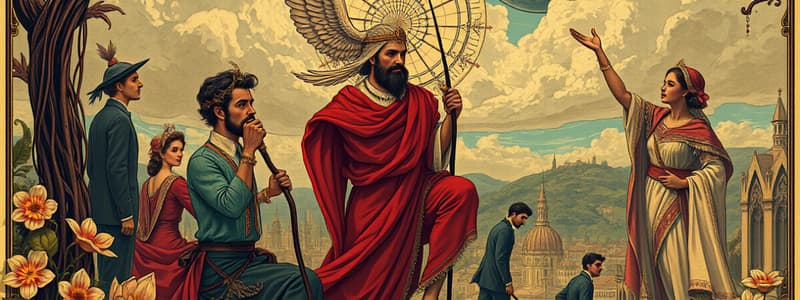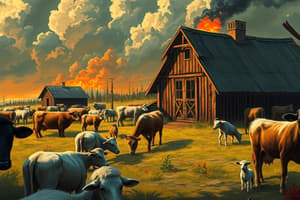Podcast
Questions and Answers
What is a key theme explored in both political science and English literature?
What is a key theme explored in both political science and English literature?
- Love and Romance
- Science and Technology
- Nature and Environment
- Power and Authority (correct)
Which literary device uses humor or irony to critique politics?
Which literary device uses humor or irony to critique politics?
- Imagery
- Satire (correct)
- Symbolism
- Political Allegory
Which author is known for exploring themes of totalitarianism in their work?
Which author is known for exploring themes of totalitarianism in their work?
- George Orwell (correct)
- T.S. Eliot
- Charles Dickens
- William Shakespeare
How does Marxist Criticism approach literature?
How does Marxist Criticism approach literature?
Which movement reflects disillusionment with traditional values after World War I?
Which movement reflects disillusionment with traditional values after World War I?
What is one impact of colonialism examined in literature?
What is one impact of colonialism examined in literature?
Which of these best describes Political Literary Criticism?
Which of these best describes Political Literary Criticism?
Which of the following themes does not typically connect political science with literature?
Which of the following themes does not typically connect political science with literature?
Flashcards are hidden until you start studying
Study Notes
Intersection of Political Science and English Literature
-
Definition:
- Political Science: The study of politics, government systems, political behavior, and political theories.
- English Literature: The body of written works produced in the English language, encompassing various genres and historical periods.
-
Common Themes:
- Power and Authority: Exploration of political structures and power dynamics in societies.
- Ideology: Representation of political ideologies, such as democracy, totalitarianism, socialism, etc.
- Revolution and Change: Depiction of social upheaval, revolutions, and their impact on individuals and societies.
- Justice and Morality: Examination of ethical dilemmas, justice systems, and moral philosophy in political contexts.
-
Key Concepts:
- Political Allegory: Literary works that symbolize political events or ideologies (e.g., George Orwell's "Animal Farm").
- Satire: Use of humor, irony, or exaggeration to criticize politics (e.g., Jonathan Swift's "A Modest Proposal").
- Historical Context: Understanding the political context during the time of writing to grasp deeper meanings.
-
Influential Authors:
- William Shakespeare: Explored themes of power, betrayal, and governance; e.g., "Macbeth" reflects on ambition and tyranny.
- Charles Dickens: Critiqued social injustices and class disparities, notably in works like "Oliver Twist" and "Bleak House."
- George Orwell: Addressed issues of totalitarianism and surveillance in "1984" and political manipulation in "Animal Farm."
-
Literary Movements Influenced by Politics:
- Romanticism: Focused on individualism and reaction against industrialization and political turmoil.
- Modernism: Reflects disillusionment with traditional values post-World War I, addressing alienation and fragmentation.
- Postcolonial Literature: Examines the impacts of colonialism and the political struggles for independence.
-
Critical Approaches:
- Political Literary Criticism: Analyzes literature through the lens of political theory and context.
- Marxist Criticism: Focuses on class struggle, capitalism, and socio-economic factors in literature.
- Feminist Criticism: Investigates gender roles, power relations, and representation of women in political contexts.
-
Importance:
- Understanding societal issues: Literature often reflects the political climate and can provide insights into historical events.
- Development of Critical Thinking: Engaging with political themes in literature encourages analysis and critical reflection on contemporary issues.
- Cultural Reflection: Literature serves as a mirror to society, showcasing the interplay between individual experiences and broader political movements.
Definition
- Political Science encompasses the study of governance, political behavior, systems, and theories.
- English Literature refers to written works in English, spanning various genres and historical eras.
Common Themes
- Power and Authority investigate the dynamics of political structures within societies.
- Ideology highlights different political beliefs, such as democracy, totalitarianism, and socialism.
- Revolution and Change focus on the effects of societal upheaval and transformative events on people and communities.
- Justice and Morality delve into ethical questions, justice systems, and political morality.
Key Concepts
- Political Allegory uses literature to symbolize political events or philosophies, notably seen in George Orwell's "Animal Farm."
- Satire critiques political practices through humor and exaggeration, exemplified by Jonathan Swift's "A Modest Proposal."
- Historical Context is vital for interpreting the deeper meanings of literary works within their political backdrop.
Influential Authors
- William Shakespeare examines power, ambition, and governance; "Macbeth" portrays tyranny and the consequences of ambition.
- Charles Dickens critiques social injustices, especially class disparities, in novels like "Oliver Twist" and "Bleak House."
- George Orwell addresses themes of totalitarianism and state control in "1984" while exploring political manipulation in "Animal Farm."
Literary Movements Influenced by Politics
- Romanticism emphasizes individualism and reacts against industrialization and political instability.
- Modernism illustrates disillusionment following World War I, depicting themes of alienation and fragmentation.
- Postcolonial Literature critiques colonial legacies and the quest for national independence.
Critical Approaches
- Political Literary Criticism evaluates texts with an emphasis on political theories and contexts.
- Marxist Criticism concentrates on class struggles and socio-economic influences reflected in literature.
- Feminist Criticism explores gender dynamics, societal power structures, and women's representations in political contexts.
Importance
- Literature often reflects societal issues, offering insights into the political climate and historical occurrences.
- Analyzing political themes in literature promotes critical thinking and encourages reflections on contemporary social issues.
- Literature acts as a cultural mirror, revealing the relationship between individual experiences and wider political movements.
Studying That Suits You
Use AI to generate personalized quizzes and flashcards to suit your learning preferences.




